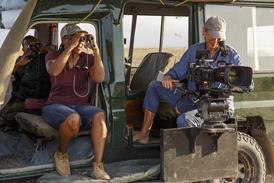Finding and nurturing the next generation of post-production talent provokes a passionate response among the industry. The issue is complicated by a lack of resources, rapidly changing technology and the bespoke nature of the facilities business.
“The industry as a whole doesn't do enough,” declares Envy managing director Dave Cadle. “Most training covers the basic technical side but doesn't reflect day to day demands. Students coming out of media colleges need to be blooded. They're like rabbits in the headlights, daunted by client-attend sessions.”
Cadle's view appears to reflect that of the majority of his peers. In an online consultation compiled in March, industry body Skillset asked the sector to identify which areas it should prioritise. The 207 responses highlighted “bridging the gap between education and employment” as a top priority ahead of “improving higher education courses” themselves.
“There have often been calls to improve the quality of media courses that feed the post sector but what is new is the emphasis on to linking colleges with the workplace,” says Skillset facilities representative Triston Wallace. “Facilities need graduates to have a far more rounded experience, and be better prepared for the workplace.”
Bridging the skills gap
Sharon Goode, director of independent training provider FT2, says: “A lot of media courses are fine in terms of their academic content, and there are some good vocational media courses where people do get industry knowledge.” She adds: “Even graduates from industry-relevant courses such as Skillset's Media Academies [a network of industry-accredited university courses] need on-the-job practical experience and this is often where the gap lies.”
Skillset's report found little or no industry buy-in for work placements. Instead, it said, each side [educators and employers] is isolated, with no real incentive to change. “The lack of engagement means education is largely unaware of what employers desire in terms of an ideal entrant,” reports Skillset. “Conversely, employers struggle to grasp the concept that educators educate - they do not train for work.”
Traditionally this disconnect has been bridged by the practice of running. Newcomers make tea to order and shuttle tapes around town hopefully learning a thing or two in the process and impressing the bosses with their enthusiasm.
Running is still considered by many - new entrants as well as management - as a fast track into the industry and the best training ground to boot. “About seven out of 10 of our operators have been runners,” says Cadle. “You get a great insight into the world of post. It's invaluable.”
Envy receives five to 10 applications for runners daily. Of the 59 it has taken on since it launched two years ago, 17 are currently runners; 18 have moved up from the starting point - the kitchen; 10 were fired and another 13 quit.
“If they can survive in the kitchen they can probably survive in the machine room,” says Cadle. “In either place you can quickly evaluate what their personalities are like. Post-production requires teamwork. Running sorts out those who are keen to work in post from those who think they want to work in post.”
To the outside world, post is an opaque business which often gets oversimplified as “editing”, a role many applicants aspire to. Becoming a runner is an eye-opener to a whole new set of processes which graduates with an open mind can exploit.
“There's never been a formal route into the industry,” says Rushes managing director Joce Capper. “Running is the best means of finding out about how the building works and how the tasks runners carry out fit into the whole production process.”
Runners are expected to work hard for little money but those with the right attitude will be taken under a facility's wing and given the opportunity to learn on the job or be given internal training.
Ascent Media for example requires all its VT operators to take a course in tape formats. This follows a “front of house” course providing an overview of all post services and technologies. However, not all facilities use runners since slim margins mean they can't afford either the time or cost of doing so.
“The runner experience varies widely,” says Wallace. “Some companies can pay a decent wage and allow runners to gain experience. Other runners remain catering staff with very little expectation of progress. Facilities are glad of an extra pair of hands and there's an army of people willing to do it but runners are generally those who can afford to work for next to nothing because they have alternate sources of funding. This can create barriers to entry and narrow the base of intake.”
First Post, co-devised with the sector and managed by Skillset, is an initiative that was introduced last year to plug the gap between the education provided by college courses and the skills required by employers. It aimed to provide a more structured training regime for new employees. The six-month long scheme has been rolled out from London to Bristol, Cardiff and Manchester to more than 100 graduates yet, astonishingly, toward the latter stages of the London pilot it struggled to find applicants. Applicants were nominated by facilities who paid around£800 per place with the full£8,000 cost subsidised by public monies, including regional development agencies.
Possible reasons for the poor take-up, according to Wallace, may have been that facilities would see no immediate return on their investment of time and money as First Post is designed to build long-term skills and/or that facilities simply weren't looking to invest in junior staff at the time. “It was a bit disheartening,” he says.
Of greater concern for the scheme's future is that the heavy public subsidies that underwrote the scheme (the London Development Agency for example provided around£250,000) are unlikely to be renewed. Instead, First Post content is likely to be used in colleges and universities to provide an apprenticeship scheme, possibly leading to a new qualification. This could work in a number of ways according to Wallace. Colleges could provide lengthy placements with post houses as part of the apprenticeship. Alternatively, new employees at facilities houses could be offered short-term placements at Skillset academies. “It may mean working more closely with the Skillset Media Academies to ensure they produce graduate talent suitable for the needs of the companies,” he adds.
In addition, elements of the First Post course may be sold back to the industry, to be delivered by independent trainers. “The money we secured was never intended to be long-term,” explains Wallace. “First Post was a means of experimenting with content and exploring different funding models, which we always intended to adapt.” He adds: “If the industry wants to continue recruiting a graduate workforce it needs to either fund postgraduate courses or greatly improve its working relationship with colleges.”
UK Screen Association chief executive Gaynor Davenport says that if new forms of funding for graduate post-production training are not found it will be “a travesty”. “Every time we establish a training course it helps fine-tune the next one but in order to establish future schemes we need to tap into alternate funding streams, perhaps available from other parts of Skillset. Employers also need to work out how much they are willing to contribute,” she says.
Companies in the north-west and Yorkshire and Humberside still have time to take advantage of First Post, which is being expanded to these areas.
Developing runners
Some facilities seem keen to see the initiative survive. Cadle suggests that Envy would be prepared to partner with colleges by running weekend courses at its premises for students to get to grips with a real work environment.
Finding a solution to the problem of integrating new graduates into the work-place then moving them through the career ladder is becoming increasingly urgent. “If we don't find a way to develop runners who are based in the library or machine room onto the next level as an operator I don't know where my creatives are going to come from,” warns Capper. “If we don't properly train machine room staff ourselves we have to recruit ready skilled staff who command high salaries. But because machine room operations are not directly charged to the client we face an increase in our running costs.”
The increased complexity of technology, particularly in terms of shared storage and media management, coupled with a low level of IT understanding among junior personnel adds to the strain facilities are under when it comes to bringing new entrants up to speed.
“There's neither time nor internal resources available for the traditional approach of figuring new technology out,” explains Avid head of professional services/training Jason Plews. “Staff need to make full use of the equipment from day one, and training plays a big part in making that happen.”
“IT people don't understand moving images and those from a video background don't fully understand IT,” adds Roger Henderson, managing director of Ascent Media's content distribution business. “There's huge conflict and a need to cross-fertilise groups.”
Plews adds: “Everybody from a facility manager down has some IT knowledge but it's not as good as it should be.”
Enhanced technical training aside, there is at least an equal need for promising new entrants to have a foundation in managerial, business development, sales and marketing. Arguably the concentration on practical skills has distracted facility bosses away from improving “leadership and management” which the industry ranked as the second most important area to focus on after “bridging the gap between education and employment” in Skillset's online consultation.
“Many facilities have grown organically and are not necessarily equipped to handle rapid change,” Davenport says. “There's now a recognition at all levels that a structured approach to leadership puts business on a solid footing.”
Big break: HOW three post-production staffers got started
Nick Timms Edit assistant
Studying graphic design at Surrey Institute of Art and Design gave Timms a solid grounding in Final Cut and After Effects, which was cemented during a week's placement at Baraka Post. After an invitation from a family friend, Timms landed a runner's job at St Anne's.
“I'm very motivated and in quiet periods I hung around with assistant editors trying to get as much experience as I could,” Timms says. “I was able to take the skills that I learned as a runner into the VT department and move through the ranks a bit quicker.”
Currently assisting on Paul Greengrass' feature Green Zone, Timms' goal is to be an online editor: “I'm fortunate that I'm able to learn from my colleagues during the day and use the machines in my downtime to edit personal projects.”
Brad Le Riche Motion graphics designer
Psychology graduate Le Riche, 27, had no prior knowledge of post until a friend, running in Soho, piqued his interest.
He ran for Ascent companies Visiontext and Music and Agency learning encoding techniques in the machine room. At Rushes he took a series of online tutorials for graphics software such as Flame, funded by the facility.
“I learned a great deal from these courses which were available to anyone,” says Le Riche. “I'm in the right department now. I enjoy what I do and realise that graphics software will play a prominent part of post in the future.
“It's definitely advisable to start by running,” he adds. “You get a broad experience of how the industry works and understand where details like FTP and tape formats fit into the system.”
Pip Whittall Assistant producer
A placement with producer Baby Cow as part of a technical theatre course at Rada gave 24-year-old Whittall a first glimpse of TV production.
“I was intrigued and wanted to know more about it,” she says.
Her CV was spotted on online directory Production Base by facility manager Natascha Cadle scouting for runners to help launch Envy in 2006.
After just six weeks' running she moved to reception and then to bookings, handling short-form projects. As assistant to senior producer Jannine Martin, she's now working on long-form programmes such as The Restaurant.
“Courses can only teach you so much,” she insists. “The best thing I did was work up from runner because it gives you a chance to assess how everything works.”

























No comments yet